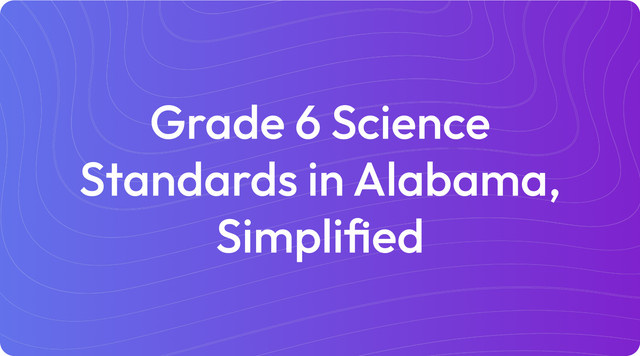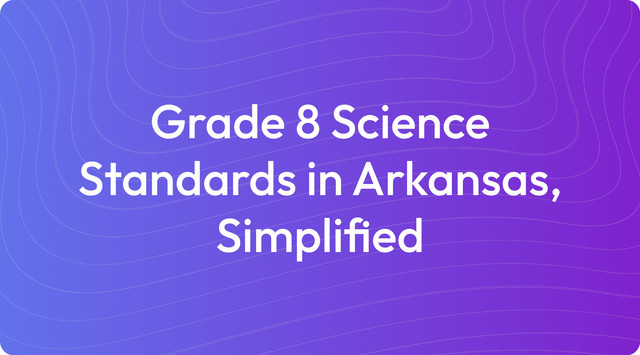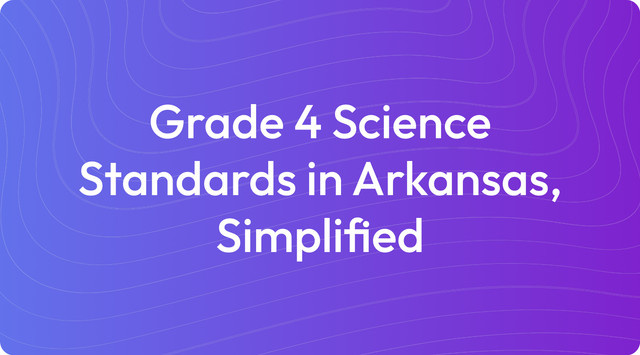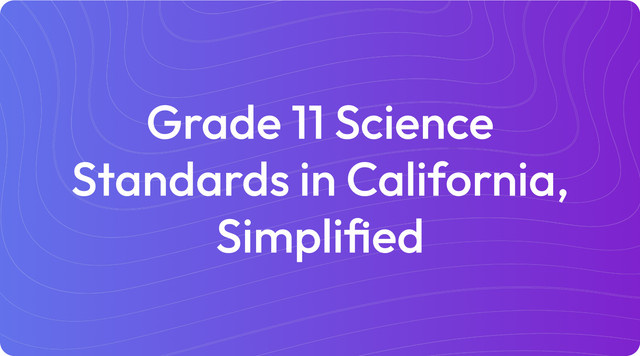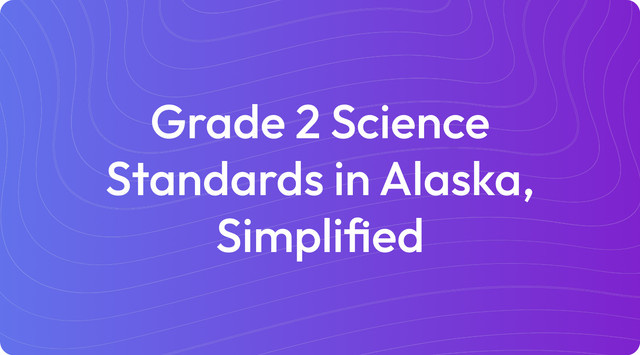Grade 12 Science Standards in Arkansas, Simplified
Grade 12 students in Arkansas choose advanced science or electives, including Physics, Environmental Science, Anatomy, and AP courses tailored to their interests. Read more now.
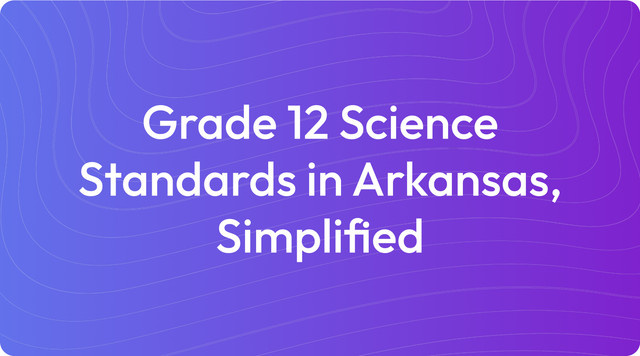
We understand that academic standards can sometimes feel complex and prescriptive. Our goal is to help you see them not as a rigid set of rules, but as a clear guide for what your students need to learn. Let's break down what standards are and how they function in your classroom.
Education standards are learning goals that outline what students are expected to know at each grade level. For teachers, this means you have clear targets for student learning but maintain the freedom to design your own lessons and choose your curriculum. For example, while an Arkansas 12th-grade science standard might specify learning about 'Motion and Stability' (HS-PS2), you decide which activities and materials will best help your students grasp those concepts.
What Are Grade 12 Science Standards in Arkansas?
In Arkansas, 12th-grade science standards are tied to the specific advanced or elective courses students choose. Since most have completed foundational requirements, senior year is a chance to explore specialized topics. Here is a general breakdown of the standards for common course options:
- Physics Standards (HS-PS)
- HS-PS2: Motion and Stability, covering Newton’s laws, forces, and momentum
- HS-PS3: Energy, focusing on the relationships between energy, work, and motion
- HS-PS4: Waves and Their Applications in technology and communication
- Environmental Science Standards (HS-ESS)
- HS-ESS3: Earth and Human Activity, including resource management and human impacts
- HS-ESS2: Earth’s Systems, exploring interactions between Earth's spheres
- Anatomy and Physiology Standards (HS-LS)
- HS-LS1: From Molecules to Organisms, for the study of human body systems
- HS-LS2: Ecosystems, examining interactions between human systems and other organisms
- AP Science Standards
- AP Biology: Covers advanced topics in cellular biology, genetics, and evolution.
- AP Chemistry: Focuses on complex chemical reactions, thermodynamics, and stoichiometry.
- AP Physics (1, 2, or C): Includes calculus-based physics with a focus on motion, energy, and waves.
- AP Environmental Science: Explores sustainability, resource management, and environmental policy.
The framework for these standards is guided by national topic arrangements and state resources from the Arkansas DESE.
Key Tested Standards
For Grade 12 Science in Arkansas, the key tested standards vary depending on the course students choose. By senior year, students explore advanced science topics or electives based on their interests and career goals. Understanding these standards helps you focus your instruction on the most critical concepts for end-of-course assessments.
Below are the frequently tested standards for common Grade 12 courses:
1. Environmental Science (HS-ESS)
- HS-ESS3: Earth and Human Activity
- HS-ESS3-1: Construct explanations of how natural resource availability influences human activities (e.g., water, fossil fuels, minerals).
- HS-ESS3-3: Design and evaluate solutions to minimize human impacts on the environment (e.g., renewable energy, conservation).
- HS-ESS3-4: Evaluate the costs and benefits of solutions to reduce climate change or environmental degradation.
- HS-ESS3-6: Use computational models to understand the relationships between Earth’s systems and human sustainability.
2. Anatomy and Physiology (HS-LS)
- HS-LS1: From Molecules to Organisms
- HS-LS1-2: Model how organ systems interact to maintain homeostasis in the human body.
- HS-LS1-3: Explain how feedback mechanisms regulate body systems (e.g., thermoregulation, blood sugar).
- HS-LS1-5: Model the processes of cellular respiration and explain how it provides energy for body functions.
3. Advanced Placement (AP) Science Courses
- For AP Biology, AP Chemistry, AP Physics, or AP Environmental Science, standards align with the College Board AP Framework for rigorous, college-level content. Key tested areas include:
- AP Biology:
- Cellular processes (e.g., cell communication, energy flow)
- Genetics and evolution (e.g., DNA replication, natural selection)
- Ecosystems (e.g., matter cycling, energy flow)
- AP Chemistry:
- Reaction rates, equilibrium, thermodynamics, and stoichiometry
- Atomic/molecular structure and bonding
- AP Physics:
- Motion, forces, energy conservation, and waves
- Electricity, magnetism, and fluid mechanics
- AP Environmental Science:
- Human population dynamics, renewable energy, pollution, and resource management
- AP Biology:
4. Physics (HS-PS)
- If students take Physics in Grade 12, the following standards are key:
- HS-PS2: Motion and Stability
- HS-PS2-1: Use Newton’s second law to predict the motion of objects based on forces.
- HS-PS2-4: Analyze evidence to explain gravitational and electromagnetic forces.
- HS-PS3: Energy
- HS-PS3-4: Investigate energy transfer in systems (e.g., mechanical to thermal energy).
- HS-PS4: Waves
- HS-PS4-1: Use mathematical models to describe wave behaviors and energy transfer.
- HS-PS2: Motion and Stability
5. Electives (Varies by School)
- Courses like Marine Biology, Forensic Science, or Earth and Space Science may also have tested standards related to specific topics:
- Marine Biology: Ecosystems, food webs, and aquatic biodiversity
- Earth and Space Science: Plate tectonics, climate systems, and astronomy
- Forensic Science: Applications of biology and chemistry in crime scene investigations
Key Cross-Cutting Themes Across All Courses
- Modeling: Use diagrams, equations, or 3D models to explain systems (e.g., body systems, ecosystems, energy transfer).
- Data Analysis: Interpret graphs, experimental data, and computational models.
- Problem-Solving: Apply scientific concepts to real-world scenarios (e.g., sustainability, energy systems, or human health).
Graduation Requirements in Arkansas
- Students must earn 3 science credits to graduate:
- 1 Credit in Physical Science (Physical Science, Chemistry, or Physics).
- 1 Credit in Biology (or an equivalent life science course).
- 1 Additional Science Credit (e.g., Environmental Science, Anatomy, AP courses, etc.).
This information is based on guidance from the Next Generation Science Standards and the Arkansas Division of Elementary and Secondary Education.
Example Learning Objectives for Unit Planning
Learning objectives are clear, student-friendly statements that break down broad standards into specific, measurable skills students will achieve by the end of a lesson. They guide your instruction and help students track their own progress by answering the question, "What will I be able to do?" Here are some examples for common senior-year courses, written from the student's perspective to promote ownership of their learning:
Physics
Standard: HS-PS2-1
(Analyze data to explain the relationship between force, mass, and acceleration.)
Learning Objectives:
- I can use Newton’s second law to calculate force, mass, or acceleration.
- I can analyze motion graphs to interpret how force and mass affect acceleration.
- I can design and conduct an experiment to observe the effect of force and mass on motion.
Standard: HS-PS3-1
(Develop models to explain energy conservation.)
Learning Objectives:
- I can model how potential energy and kinetic energy are transferred in a system.
- I can explain how energy is conserved in scenarios like a roller coaster or pendulum.
- I can calculate total energy in a system, accounting for transformations between forms of energy.
Environmental Science
Standard: HS-ESS3-3
(Design solutions to minimize human impacts on the environment.)
Learning Objectives:
- I can identify how human activities like deforestation and pollution affect ecosystems.
- I can evaluate solutions, such as renewable energy or conservation, to reduce environmental impacts.
- I can propose a plan to improve sustainability in a specific environment.
Standard: HS-ESS3-4
(Evaluate solutions to reduce climate change impacts.)
Learning Objectives:
- I can explain how greenhouse gases contribute to climate change.
- I can compare the effectiveness of different strategies to reduce carbon emissions.
- I can use evidence to recommend actions individuals or communities can take to combat climate change.
Anatomy and Physiology
Standard: HS-LS1-3
(Explain how feedback mechanisms regulate body systems.)
Learning Objectives:
- I can describe examples of feedback mechanisms, like thermoregulation or blood sugar control.
- I can explain how body systems, such as the nervous and endocrine systems, work together to maintain homeostasis.
- I can use a model to show how disruptions in feedback mechanisms affect the body.
Standard: HS-LS1-2
(Model how organ systems interact to maintain homeostasis.)
Learning Objectives:
- I can describe the functions of major organ systems, such as the circulatory, respiratory, and digestive systems.
- I can explain how multiple organ systems work together to support the body (e.g., how the respiratory and circulatory systems exchange oxygen and carbon dioxide).
- I can analyze how diseases or injuries affect the balance of organ systems.
Key Changes & Updates
The most significant update to Arkansas's Grade 12 science standards came in 2015 with the alignment to the Next Generation Science Standards (NGSS). This introduced a "three-dimensional" approach to learning. Instead of focusing only on content, the standards now ask you to integrate scientific practices—like investigating and modeling—with core ideas and overarching themes that connect different science disciplines. The goal is to ground learning in real-world phenomena, encouraging students to solve problems they might actually encounter, from understanding how an engine works to analyzing human impacts on an ecosystem.
For students, this means demonstrating their knowledge through performance-based tasks. They will be asked to analyze data, build models to explain processes, and construct evidence-based arguments. This approach also promotes systems thinking, helping students see how organ systems work together or how Earth’s spheres interact. With a greater variety of electives and AP courses available, you have more flexibility to guide students toward specialized topics that align with their interests and prepare them for college-level work in science, healthcare, or engineering.
Create with TeachShare
We know that turning these detailed standards into engaging classroom materials takes time and effort. Our platform is designed to help you with that process, giving you the tools to quickly create lessons, activities, and assessments that are perfectly aligned to your specific science standards. Start creating standards-aligned instructional resources with TeachShare now.
Frequently Asked Questions
1. What are the science graduation requirements in Arkansas, and what courses can 12th graders take?
Students in Arkansas need three science credits to graduate: one in Physical Science, one in Biology, and one additional credit of their choice. Twelfth graders often take advanced electives to meet this third credit requirement, including courses like Physics, Environmental Science, Anatomy and Physiology, or an AP Science class.
2. How do these senior-year science courses prepare students for college and careers?
These courses are designed to build practical skills for students' futures. For example, Physics and Chemistry strengthen the problem-solving abilities needed for STEM fields, while Environmental Science develops critical thinking for careers in sustainability or policy. Anatomy and Physiology provides a strong foundation for those interested in healthcare, and AP courses can help students earn college credit early.
3. What are some real-world applications I can bring into my classroom?
The standards encourage making science relevant to students' lives. Here are a few ideas you can adapt for your classroom:
- Physics: Have students investigate how waves are used in everyday communication technology like Wi-Fi.
- Environmental Science: Task your class with evaluating different approaches to mitigating local pollution.
- Anatomy and Physiology: Use case studies to explore how specific diseases affect the body's systems.
4. How are students assessed in these advanced science courses?
Assessments focus on applying knowledge rather than just recalling facts. You can expect to see methods that measure deeper understanding, such as:
- Performance tasks: Students might be asked to model energy conservation for a physics lesson or propose a solution to an environmental problem.
- Data analysis: This involves having students interpret graphs related to population growth or analyze data from their own experiments.
- Constructed responses: Students practice writing evidence-based explanations for complex topics like climate change or organ system interactions.
5. What are some key vocabulary terms my 12th graders should know?
As courses become more specialized, so does the vocabulary. Here are some core terms for different subjects:
- Physics: force, momentum, energy transfer, wave frequency, voltage
- Environmental Science: sustainability, biodiversity, carbon footprint, renewable resources
- Anatomy and Physiology: homeostasis, feedback loop, organ systems, ATP
- AP Courses: These include more advanced concepts specific to the course, such as thermodynamics or gene expression.
Answer


